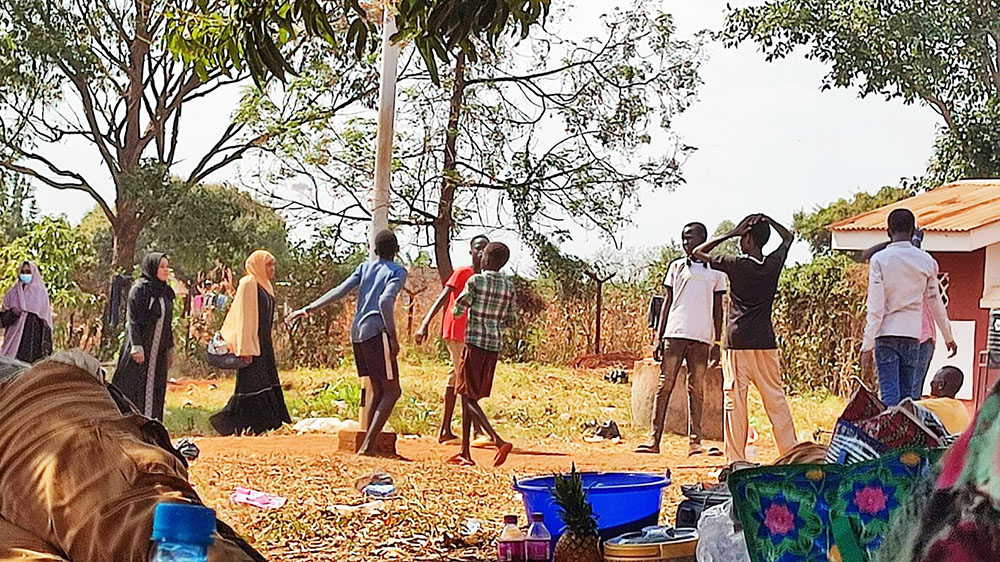
Sudanese refugees in Uganda.. ``Miserable Reality``
Report: Translated by moatinoon
The reality of Sudanese refugees in Uganda is no different from that of Sudanese refugees in camps in other countries. The suffering is almost as frequent as it is, according to activists and jurists.
The suffering of Sudanese refugees in the Kiryandingo camp, about 400 kilometres from the Ugandan capital of Kampala, is the problems of access to food, drinking and treatment, as well as asylum procedures, according to press and human rights observatories.
Ahmad Farouk, a Sudanese human rights activist residing in the Kiryandingo camp in northern Uganda, notes that "Sudanese refugees suffer from a dire reality and significant problems in completing registration procedures, most notably the slow and long wait".
"Refugees are received at temporary assembly points in preparation for their relocation to the camp, but reaching that stage often requires the refugee to take illegal ways to speed up his actions," Farouk told Al-Tahrir.
Farouk noted that most of the refugees in the camp had been forced by the war to flee their homes in Khartoum to Al Jazeera State, and when the RSF entered, they had no choice but to take refuge, "because internal displacement does not mean that you are safe from danger, especially as the war extends to new mandates."
Farouk pointed out that the Kiryandingo camp is characterized by something else, as it includes dozens of activists who fled the Sudan, because of the narrowing and arrests carried out by the military intelligence of the Sudanese army against the activists, especially those who declare a position against the war. "
"Personally, I was working to monitor violations against civilians from both sides of the war, but that did not impress the military intelligence in Sinja, which summoned me and asked me not to write about the army, which prompted me to make the asylum decision, for my own safety."
The Office of the United Nations High Commissioner for Refugees (UNHCR) announced on Tuesday that at least 39 Sudanese refugees had arrived in Uganda since the start of the war between the army and the Rapid Support Forces on April 15, 2023.
UNHCR said it had decided to expand its assistance plan for the Sudan to two other States, Libya and Uganda, as the number of refugees fleeing the war rose.
"The UN plan is less than 20 percent funded," Ewan Watson of UNHCR told reporters in Geneva. "Refugees and families are forced to sleep in the open, and medical facilities cannot keep up with the growing needs we face."
Amin Abdel Hafiz, a Sudanese refugee in the Kiryandingo camp, listed some of the suffering of Sudanese refugees in the camp, citing treatment problems, "as there are no emergency health services".
Abdel Hafeez told Al-Tahria, "The camp lacks enough tents and the existing tents themselves are not very safe, often collapsed by wind and rain."
Many refugees had arrived in Uganda after a long journey from the Sudan, passing to the State of Southern Sudan, and from there to Ugandan territory, "requiring action to accelerate action, to reduce that suffering".
The Sudan is experiencing the worlds worst displacement crisis after some 12 million people were forced to be displaced by the war, while more than 2 million of them fled across borders, according to the International Organization for Migration.
With the expansion announced by UNHCR on Tuesday in the United Nations humanitarian response plan for the Sudan, the total number of African countries receiving large numbers of Sudanese refugees rises to 7.
UNHCR predicted that 149 thousand Sudanese refugees would arrive in Libya before the end of the current year and that 55 Alpha would arrive in Uganda, which has no direct common border with the Sudan.
The United Nations response to Sudans assistance is insufficient, and there is a lack of resources, especially with some donors cutting spending due to domestic budget constraints, according to Reuters.
Sudanese journalist Badruddin Khalafallah indicates that most Sudanese refugees in Uganda arrived through border crossings from the State of Southern Sudan, along with other numbers who arrived via flights.
Khalifallah, who has been in Uganda for years, told Al-Tahriya that "Sudanese refugees who arrived through land crossings have had long and arduous journeys, some of them being looted and extorted, from some gangs, on the border between the State of South Sudan and Uganda."
He pointed out that when the gangs do not find what can be taken away from the refugee, they "detain him and demand ransom from his relatives", pointing out that the suffering also haunts refugees during the registration of refugee disclosures.
The Sudanese journalist noted that he had conducted a field investigation into the situation of Sudanese refugees and had monitored some of their suffering in the Kiryandingo camp, noting that they lacked food and faced volatile rains between heavy rains in the autumn and high summer temperatures.
Noting that refugees were experiencing difficulties due to the decline in global humanitarian support, he pointed out that Sudanese refugees had recently received some support from Saudi Arabia, the United Arab Emirates and Kuwait, which had alleviated part of their suffering.
He added that "Uganda, which has an open-door policy, grants the refugee the right to move and work, and does not oblige him to stay exclusively in the wages."
The clashes between the army and the Rapid Support Forces (RSF) have been extended to new states, with the Rapid Support Forces (RSF) on Saturday declaring control of the city of Sinja, the capital of Sennar State.
There are ongoing confrontations between the parties in Khartoum, as well as in El Fasher, the capital of Northern Darfur State, the only major city, not under the control of the Darfur Rapid Support Forces.
Source: https://www.alhurra.com/sudan/2024/07/02

